


Figures of Dissent: Cinema of Politics / Politics of Cinema
The so-called “political turn” that has been taking place in the visual arts in recent years has certainly caused a flurry of interest in the notion of “political” art, but all too rarely is the history and discourse of cinema considered. This while there is a wealth of critical insights and historical inspirations, which in light of contemporary evolutions in arts, society and visual culture, can acquire new, valuable allure.
From Jean Vigo’s “documentary social” to Edouard de Laurot’s “cinéma engage,” from Octavio Getino’s “cine militante” to Santiago Alvarez’s “cinema-urgente,” from Gilles Deleuze’s ideas on a “cinéma politique moderne” to Serge Daney’s reflections on “l’espace politique”: the annals of the past century are full of combative and critical perspectives on the political potential of cinema. To what extent do these conceptions still resonate in the dawn of the 21st century? This research project probes for answers by following in the footsteps of three leading figures from the cine-philosophical milieu: Jean-Luc Godard, Serge Daney and Jacques Rancière, not coincidentally a trio with strong ties to the “cinephile” ideology that made school in the lap of the magazine 'Cahiers du Cinéma'. Each of them has left their mark on politico-cinematographic thought from their own backgrounds over the course of the past fifty years.
In this research, their notions will serve not only as a base for a historical exploration, but also as a foundation and touchstone for a reflection on contemporary developments. The artistic practice in this research project is constituted by the curation of various programs. By this practice we understand the search and testing of the fields of tension between then and now, discourse and practice, thinking and making.
Through the creation of cross connections between different times, visions, themes and oeuvres, the potential of a contemporary “political” cinema is sought. The central question is how a the political subject of a cinematic work - related to issues of injustice, oppression and conflict - can relate today to the politics of its making, in image and sound, in terms of aesthetics and ethics.
published by AraMER
2016, EN
ISBN 9789492321244
 Echoes of Dissent (Vol. 7)research presentationAgendaArtistic activities
Echoes of Dissent (Vol. 7)research presentationAgendaArtistic activitiesFred Moten and Brandon López have been playing music together since 2018. They have released two remarkable albums with drummer Gerald Cleaver on the Reading Group label. Their first duo recording is due to be released on TAO Forms.
“It’s poetry as music and music as poetry. Moten’s words lead, lyrically, timbrally, poetically – but the bass and percussion loosen the grammar. Associative inflections elevate the raw sound of each player, which at root – even if they were stripped of meaning or mood – runs each part in a constantly moving triangulated constellation of sound and meaning, evolving and repeating; stretching, infilling, and expanding.”
- Jennifer Lucy Allen
Fred Moten is a cultural theorist and poet creating new conceptual spaces that accommodate emergent forms of Black cultural production, aesthetics, and social life. Moten’s writing and wording are characterised by a refined opacity and a musicality that is inspired by jazz and goes to the limit of noise: “what it is I want to say is subordinate to the sound, subordinate to a kind of feeling, a content that only that sound can provide”. His books include In the Break: The Aesthetics of the Black Radical Tradition, the trilogy Consent Not To Be A Single Being , The Undercommons: Fugitive Planning & Black Study and All Incomplete, co-authored with Stefano Harney, as well as numerous poetry collections.
Brandon López is a bassist, composer, and improviser working at the fringes of jazz, free improvisation, noise, and new music. His music has been praised as “brutal” (Chicago Reader) and “relentless” (The New York Times). His exploration of new sonic possibilities on the double bass has led him to work with the luminaries of the contemporary avant garde like John Zorn, Nate Wooley, Tyshawn Sorey, Leila Bordreuil and Cecilia López. He was a featured soloist with the New York Philharmonic and has been the recipient of numerous awards.
Programme
- 14:00, Conversation with Fred Moten and Brandon López at Pianofabriek (free entrance)
An extended conversation with Fred Moten and Brandon López about their thought and practice, music and language, improvisation and politics, jazz and study. - 20:00, Performances at Les Ateliers Claus (12 euro)
Rue du Fortstraat 35
1060 Sint-Gillis
Rue Crickxstraat 15
1060 sint-gillis
 Echoes of Dissent (vol. 6)research presentationAgendaArtistic activities
Echoes of Dissent (vol. 6)research presentationAgendaArtistic activitiesWITH SIMON FISHER TURNER, ALESSANDRA NOVAGA & LUKE FOWLER
Derek Jarman loved to use archaeology as a metaphor in his work: in his painting, in his written memoirs, and in his cinema, which he recurrently characterised as an “archaeology of soul”. An apt metaphor for the work of an artist who always strived to dig down deep into England’s Hidden Reverse, tirelessly and unflinchingly searching to reassemble the fragments of a world he saw falling apart, including his own private world. Shortly after being diagnosed HIV positive, he bought a little plot of land in Dungeness — amidst a seemingly inhospitable landscape known as “the desert of England”. There, Jarman continued to excavate industrial and political leftovers, scavenging and cultivating the bleak wasteland to create a scenography of forgotten riches and new blossoms. It’s hard to avoid considering his garden at Prospect Cottage as the ultimate repository of Jarman’s life and work. Like his cinema, the garden was wild yet meticulously tended, English and alien, refined and subversive, avoiding walls or fences. A celebration of growth and existence, beauty and resilience, it also stands as a memorial to silence and disappearance.
The approach to many of Jarman’s film works is similar to the layering of the palimpsest — conjuring up former and new forms on a palimpsestuous surface where they meet and contest one another. This is particularly the case for the inventive layering of his films’ soundtracks, the result of a process that he once called “the archaeology of sound”. Variably playful and quotational, violent and mournful, electronic and classical, the soundtracks heightened the time travel effect of his films, shuttling backwards and forwards through history, while animating the image tracks with a kind of sympathetic resonance or momentary dreaming between the two. As Dan Barrow has noted: “Just as individual shots, characters and narrative fragments in Jarman’s films ping, semi-maddeningly, out of their provisional contexts, forcing the viewer to reconceive the film’s shape at every step, so the music often seems to disappear into its own game of reverie and seduction before momentarily touching the carnal vicissitudes of the image.”
From the punk aesthetics of his second feature Jubilee (1978) to collaborations with musicians and bands as Throbbing Gristle, Psychic TV, Brian Eno or Coil, the work of Jarman was instrumental in bridging the magical gap between the UK’s experimental music underground and the avant-garde film and art world. But Jarman’s most enduring and fruitful sonic collaboration was undoubtedly with Simon Fisher Turner. Their friendship started when Turner worked as a driver during the production of The Tempest (1979), after which Jarman invited him to compose soundtracks for a string of Super 8 films and the feature Caravaggio (1986). Their working partnership continued into the 1990s, culminating in Jarman’s final, devastating and liberating film, Blue (1993). Inspired by Robert Bresson’s note on sound from his Notes on the Cinematograph: “the noises must become music,” Turner’s work blends field recordings — which he prefers to call “life recordings” — with classical and modern elements, incorporating a variety of instrumentations, textures and colours into rich sonic frescos that, like the work of Derek Jarman, resolutely defy containment and categorisation. A palimpsestic poetics accommodating the multiplicity of the present, embracing the spectres of the past as well as the promises of the future.
With this programme of screenings, conversations and performances, we would like to pay homage to the work of Derek Jarman and Simon Fisher Turner.
 Ways of Listeningresearch presentationAgendaArtistic activities
Ways of Listeningresearch presentationAgendaArtistic activitiesDoc’s Kingdom will be back in Odemira from 19 to 23 November 2024, with a programme of screenings, debates, installations, sound performances and collective meals.
Under the title “Ways of Listening”, this year’s programme, curated by Stoffel Debuysere, aims to counter the traditional focus on visuality by developing critical perspectives on documentary from the point of view of sound. In order to imagine and discuss the political and ethical possibilities and implications of the sonic, Doc’s Kingdom will be deployed as a space for collective study that insists on more than meets the eye; a space for viewing and re-viewing cinema in the key of listening.
 Echoes of Dissent (vol. 5)concertresearch presentationAgendaArtistic activities
Echoes of Dissent (vol. 5)concertresearch presentationAgendaArtistic activitiesWhat could it mean to practice politics by performing music? How could musical improvisation – as a process of collectively searching for sounds and for the responses that attach to them, rather than thinking them up, preparing them and producing them – reconfigure our sense of the world? How can we experience and understand music not simply as what presents itself in the context of sound-phenomena-organised-in-time-and-exchanged-for-cash within the factory of post/industrial capitalism, but also, as an aesthetic-poetic-political mode of enquiry, a mode of perception, a way of learning and sharing – in and outside of the vibrations of sound or the marks of language?
These and other questions will be explored over two days through the practice of X- Ray Hex Tet – an ongoing collaboration between:
Billy Steiger – celeste and violin
Crystabel Riley – drums
Edward George – words and music
Pat Thomas – piano and electronics
Paul Abbott – drums and synthetic sounds
Seymour Wright – alto saxophone (actual and potential)
Six musicians of different backgrounds working at the margins of what is (to many) acceptable in terms of music, genre, technique, interpretation, history and ‘tradition’; a set of subjectivities, energies and philosophies who, in dialogue together, venture and probe the awkward wealth and friction of investigation, finding pleasure (and treasure) in searching for the hidden, secret, and mysterious at the edges of music and meaning.
They will release a recording through Reading Group (New York) in October.
Stoffel Debuysere is affiliated as an artistic researcher to KASK & Conservatorium, the school of arts of HOGENT and howest. The research project Echoes of Dissent was financed by the HOGENT Arts Research Fund.
i.c.w. Courtisane, Auguste Orts en In Vitro
supported by Flanders State of the Art, VGC (Vlaamse Gemeenschapscommissie) and Q-O2.
Rue Crickxstraat 15
1060 brussels
20.10.2024, 14:00
 Echoes of Dissent (vol. 4)filmresearch presentationAgendaArtistic activities
Echoes of Dissent (vol. 4)filmresearch presentationAgendaArtistic activitiesOur voice is what differentiates us from one another and relates us to one another. The voice concerns the throat, saliva, and breath, the chest and lungs, the patina of experienced life, the pleasure of shaping sound waves, the acoustic emission that emits from mouth to ear, as grain, timbre, vibration, rhythm, language. It resonates at the confluence of the individual and the collective, the phonetic and the semantic, interior and exterior, sound and sense. The voice is body and speech, sighs and cries, groans and moans, humming and hawing.
The voice is soul. Voice is noise. It’s what makes us unique as individuals but also powerful as a community. When attending to the question of resistance, of disagreement and redistribution, the emphasis is often on giving voice, speaking up, talking back, on the political act of voicing dissent, articulating demands, vocalizing laments. But what does it exactly mean ‘to voice’? How can we hear and understand the voice as something political?
With these questions in mind, we have invited vocalist, composer, voice and movement artist Elaine Mitchener to compose a programme of performances, conversations and video works that could breathe life into the voice in all its poetic and political force.
Curated by Elaine Mitchener
 Courtisane festival 2024, ResidenciesfilmAgendaArtistic activities
Courtisane festival 2024, ResidenciesfilmAgendaArtistic activitiesWe're excited to announce that the Courtisane festival 2024 will take place from March 27th to March 31st in Ghent. KASKcinema is one of the festival's venues. A lot of events during the festival are planned in the framework of the research project Echoes of Dissent, about the politics of sound and soundtrack. Among them the programmes Thinking with Dub Cinema (with Kodwo Eshun, Louis Henderson and Lynnée Denise) and Politics of the Voice (with Loré Lixenberg, Audrey Chen, Nhã Thuyên, Jay Bernard, Esi Eshun, Elaine Mitchener, Neil Charles), as well as numerous conversations with artists and filmmakers about sound in their work, including Pedro Costa, Kamal Aljafari, Claudia von Alemann, Manon de Boer and Annik Leroy.
A new publication in the Echoes of Dissent series will be released during the festival: 汾阳的喧嚣 Ironic Resonance, Anti-sound Design and Radical Cacophony in Jia Zhangke's 小 Xiao 武 Wu by Morgan Quaintance.
Courtisane is a platform for film and audiovisual arts. Through a yearly festival, film screenings, talks and publications, we research the relations between image and world, aesthetics and politics, experiment and engagement.
 Echoes of Dissent (vol. 3)filmresearch presentationAgendaArtistic activities
Echoes of Dissent (vol. 3)filmresearch presentationAgendaArtistic activitiesHoe te denken over dub cinema? Hoe te denken over dub in, als, met cinema? Hoe en op welke manieren kunnen we over cinema denken aan de hand van dub? Hoe en op welke manieren maakt dub, niet begrepen als een genre maar als een sonisch proces dat het wezen van de song ontbindt, de tijdsstructuren van cinema ongedaan?
Op welke manieren nodigt cinema uit om na te denken over de manier waarop dub, niet enkel opgevat als een sonisch maar ook als een cine-sonisch proces, de onverbondenheid dramatiseert van zwarte cinema met, of voor, de instituten van de esthetiek, het voorouderlijke, het archivale, de auteur, het authentieke, de avant-garde, het lichamelijke, het communitaire, het formele, het gender- specifieke, het generieke, het historische, het militante, het narratieve, de natie, het orale, het poëtische, het politieke, het populaire, het raciale, het verzetbare, de strijd, het seksuele of het traditionele waarop het denken een beroep doet om de samenhang van cinema te organiseren?
Denk aan Thinking with Dub Cinema als twee studiedagen, een filmprogramma en een dub sessie gewijd aan deze vra- gen. Een uitnodiging tot studie die zich wijdt aan een praktijk van luisteren naar cinema, mogelijk gemaakt door het kijken naar Handsworth Songs (Black Audio Film Collective, 1986).
Tijdens studiesessies onder leiding van Kodwo Eshun, Louis Henderson en Lynnée Denise vertrekt Thinking with Dub Cinema van een uitnodiging om na te denken over Handsworth Songs. Elke sessie nodigt deelnemers uit om hun kijk-, lees- en luisterpraktijken af te stemmen op het ontwikkelen van een dub-methodologie voor de verbeelding van auditieve blackness, zwarte auditie, collectieve auditie en filmische collectiviteit die Handsworth Songs aankondigt.
Denk aan Thinking with Dub Cinema als een bijeenkomst rond een idee van dub cinema dat in eerste instantie werd voorgesteld door Greg Tate in 1988 en vervolgens door Okwui Enwezor in 2007. In ‘Never Mind the Sex Pistols, Here Comes Sankofa,’ gepubliceerd in The Village Voice op 30 augustus 1988, schreef Tate:
“Black Audio Film’s Handsworth Songs is dub cinema — dub, voor niet-ingewijden, is die vorm van reggae waarbij de leadzang is verwijderd en de ruimte op de voorgrond is gevuld met geregenereerde en vervallende geluiden die een mythisch Afrikaans verleden en toekomst willen oproepen. Het is ogenschijnlijk een documentaire, maar de free-floating en spectrale behandeling van historisch beeldmateriaal getuigt van de mystiek van de zwarte Britse burger en bekritiseert tegelijkertijd de commercialisering van het zwarte imago. Handsworth Songs is een gecomprimeerd koor van zwarte Britse stemmen, die door het op de voorgrond plaatsen van de witte media en de politie in de positie van being Other worden geplaatst.”
In ‘Coalition Building: Black Audio Film Collective and Transnational Post-colonialism’ (verschenen in The Ghosts of Songs: The Film Art of the Black Audio Film Collective onder redactie van Kodwo Eshun en Anjalika Sagar, 2007), betoogde Enwezor:
“Hoewel Handsworth Songs ogenschijnlijk de politieproblematiek behandelt, weerspiegelt het diepgaander de agency van de onderdrukten; het vertelt hun verhalen, niet alleen vanuit het gezichtspunt van de gebeurtenis waaraan het zijn naam ontleent, maar ook door middel van een archeologie van het visuele archief van minderheden in Groot-Brittannië. Zoals zo vaak het geval is in het werk van Black Audio Film Collective, informeren de spoken van die verhalen het idee van een historisch gekleurde dubcinema waarvan de ruimtelijke, temporele en psychische dynamiek de verspreide trajecten van immigrantengemeenschappen weerspiegelt.”
Denk aan Thinking with Dub Cinema als een uitnodiging om de “free-floating en spectrale behandeling van historisch beeldmateriaal” die Tate voorstelt en het “idee van een historisch gekleurde dubcinema” die Enwezor naar voren schuift, te horen als suggesties of, beter nog, als suggestures, om Ian Penmans term te gebruiken, voor het bedenken van een cine-poesis van de echo en een cine-praktijk van de version.
Handsworth Songs horen als dub cinema is het uitwerken van de manieren waaropHandsworth Songs zijn versie van cinema en zijn cinema van de versie beoefent. Handsworth Songs horen in en als een cine-mix is aandacht schenken aan de manieren waarop Handsworth Songs filmversies maakt. Naar dub cinema luisteren in Handsworth Songs is luisteren naar de latente dimensies van het retroactieve en het proleptische die beschikbaar worden voor het denken in de geluiden en de beelden die Handsworth Songs inzet.
Handsworth Songs beluisteren vanuit de plaats van de queer epistemologie van Isaac Julien’s Territories, de televisie-ballade van Philip Donnellan’s The Colony, het negrofobe Pathé-journaal van Our Jamaican Problem en de begrafenispoëtica van Sir Collins & The Versatiles is het denken oriënteren op de manieren waarop Handsworth Songs in de archieven duikt om het leven en sneven van zwarte burgers te behoeden voor de dreigende vergetelheid.
Denk bij Thinking with Dub Cinema aan een uitnodiging om in te gaan op de manieren waarop Handsworth Songs een cinema van vervreemding en ontheemding aankondigt. Een uitnodiging om te belichten, te verklaren en op te helderen op welke manieren en langs welke wegen cinema zijn dub-epistemologieën, dub-kosmologieën, dub-akoestemologieën, dub-ontologieën, dub-psyches en dub-affinititeiten dramatiseert.
Curated by Kodwo Eshun and Louis Henderson
 Echoes of Dissent (vol. 2)concertresearch presentationAgendaArtistic activities
Echoes of Dissent (vol. 2)concertresearch presentationAgendaArtistic activitiesTo mark the closing weekend of Trevor Mathison: From Signal To Decay: Volume 4, argos presents a special event with Trevor Mathison and Nkisi. Highlighting two distinct yet related approaches to radical Black sound and its interweaving aesthetic explorations, both artists respond to and extend Mathison’s exhibition.
This is the second iteration of a series of gatherings gravitating around the question: How to think of the sonic as a site of dissent? It also indicates the launch of Trevor Mathison's second record on Purge Records, which is called From Signal to Decay, Volume 5.
Schedule
- 17:00–18:00 Sonic intervention by Trevor Mathison
- 18:00–19:00 Talk with Trevor Mathison and Nkisi
- 19:00–20:00 Break with food and drinks
- 20:00–[...] Hybrid live/DJ set by Nkisi
Stoffel Debuysere is affiliated as an artistic researcher to KASK & Conservatorium, the school of arts of HOGENT and howest. The research project Echoes of Dissent was financed by the HOGENT Arts Research Fund.
Werfstraat 13 Rue du Chantier
1000 Brussel
 Echoes of Dissent (Vol. 1)research presentationAgendaArtistic activities
Echoes of Dissent (Vol. 1)research presentationAgendaArtistic activitiesIn the context of the research project Echoes of Dissent, artistic researcher at KASK & Conservatorium Stoffel Debuysere organises an eponymous event at Beursschouwburg in co-operation with Argos, Auguste Orts and Courtisane. This is the first iteration of a series of gatherings gravitating around the question: How to think of the sonic as a site of dissent?
This two-day program proposes to think and experience the sonic as a site of refusal, insurgency and world-making. How could a poetics of the undercommons sound like? How to make it re-sound? How can we shape modes of fugitive listening and forms of attunement attending to sonic practices that refuse the call to order? How can we organize collective discursive spaces where we can share and expand the emancipatory operations performed by sound and music?
The Listening Sessions, modeled on the practice of Le Mardi Gras Listening Collective, take Stephen Henderson's overlooked 1972 book, Understanding the New Black Poetry: Black Speech and Black Music as Poetic References, as a basis for jam-like conversations around “the form of things unknown”. We will imagine and discuss the political charge of the audial and the aural; of hearing and listening.
Throughout the program, sound takes on different shapes, from embodied soundings (Hannah Catherine Jones) to sonic autobiographies (Ain Bailey). We will explore how the secret life of sonic forms circulates within khuaya-rings (Simnikiwe Buhlungu) and how it reverberates in Trevor Mathison’s work for the Black Audio Film Collective (Kodwo Eshun).
– Listening sessions, performance workshop, DJ-sets and film installation with Le Mardi Gras Listening Collective (Dhanveer Brar Singh, Louis Moreno, Paul Rekret, Edward George), Ain Bailey, Hannah Catherine Jones, Kodwo Eshun, Bhavisha Panchia, Rokia Bamba and Simnikiwe Buhlungu.
PROGRAMME
FRIDAY 2.06
13:00 - 13:30 Slow arrival
13:30 - 15:30 Listening Session 1 (golden space +2)
16:00 - 18:00 Listening Session 2 (golden space +2)
18:30 - 19:30 lecture by Kodwo Eshun on the aesthetic of Black Industrialism in the work of Trevor Mathison (golden space +2) The lecture is associated with the exhibition Trevor Mathison: From Signal to Decay, Volume 4 at argos (27.05.23—24.09.23)
22:00 - 3:00 Out Loud x Echoes of Dissent: performative set by Foxy Moron (Hannah Catherine Jones) & DJ sets by Ain Bailey & OJOO GYAL (rooftop +5)
SATURDAY 3.06
13:00 - 13:00 Slow arrival
13:30 - 15:30 Sonic Stories, workshop by Ain Bailey (beurscafé 0)
16:00 - 17:30 Listening Session 3 (golden space +2)
18:00 - 19:30 Listening Session 4 (golden space +2)
20:30 - 21:30 Embodied Listening Session by Hannah Catherine Jones (beurscafé 0)
22:00 - 3:00 Out Loud x Momsnightout: DJ sets by Clara!, Tatyana Jane, NMSS, Illsyll & Fatoosan (rooftop +5)
LISTENING SESSIONS
FR 2.06 & SA 3.06
without reservation
Through sonic and discursive contributions, the listening sessions engage with a text entitled “the form of things unknown,” which is the introduction to Stephen Henderson's anthology Understanding the New Black Poetry: Black Speech and Black Music as Poetic References. Drawing inspiration from Henderson’s portrayal of “the other side of the tradition” of black poetry, the sessions propose to collectively draw out our own “unwritten songs, rhythms and speech”. Rokia Bamba, Bhavisha Panchia, Kodwo Eshun and Hannah Catherine Jones join the listening sessions facilitated by Le Mardi Gras Listening Collective (Dhanveer Brar Singh, Louis Moreno, Paul Rekret, Edward George).
SONIC STORIES
SA 3.06, 13:30 - 15:30
reserve your spot
Ain Bailey invites visitors to participate in a “sonic autobiography” workshop, which explores the role of music in the formation and mobilization of memory. The interactive session will focus on collaborative listening to individually collected sound elements. Bailey, thus, opens up a space of sensory resonance in which forms of communication and exchange about experiences are explored beyond the predominant realm of spoken language. Please bring a small selection of music that carries personal meaning. If you do not have a USB stick, a list of music titles should be supplied in advance, and we will endeavour to source them.
EMBODIED LISTENING SESSION
SA 3.06, 20:30 - 21:30
without reservation
Hannah Catherine Jones will present a triangular dialogue between the resonating chambers of our bodies, singing bowls tuned to 432 Hz, and a carefully selected playlist of healing sounds also tuned to 432 Hz, creating an embodied experience of HCJ’s research into the physiological healing potentials of tuning down.
ONGOING INSTALLATION
13:00 - 23:00 CINEMA The Khuaya by Simnikiwe Buhlungu (2022, 6 min 16)
We're dropped mid-conversation of friends discussing a recent neighbourhood story that's been going around, of holes that have been dug into which neighbours have been tripping and falling.
Woven into this is a context where the thoughts/commands/questions/replies and voices of the sun, plants, water etc. are taken in equal measure and seriousness as the four friends.
This is a chapter in a larger project which looks at the ways in which we come to know (other chapters include a puddle, a lost wallet, a library and honey bees). The Khuaya here (rethinking how 'choir' is spelled and situated) functions not as a noun (i.e. a khuaya of people singing) but rather a verb (i.e. khuaya-ring; a gesture of gathering to share/disseminate and store knowledges through the form of useful gossip, inconsistent stories, trivia, daily news, announcements, things to remember by storing them, through which, song/sound becomes a welcome byproduct), but also as a space where listening takes place. As a backbone to this happening is a clear historical and cultural lineage of singing-to-store and the resilience of languages being passed on transgenerationally.
ARTISTS’ BIOS
Le Mardi Gras Listening Collective, named after a bar in Pittsburgh where the collective first gathered , comes together irregularly to play music publicly, and to talk about that music. The work of the Collective is based on an idea that music can be studied together as an embodied form of theorizing, and as an insurgent tradition of social and aesthetic communication. The collective features Fred Moten, Stefano Harney, Dhanveer Brar Singh, Fumi Okiji, Ronald Rose-Antoinette, Louis Moreno, Paul Rekret and Edward George. Four members of the collective will participate in Echoes of Dissent (Vol. 1).
The research of Dhanveer Singh Brar focuses on histories of black diasporic culture and politics from the mid-twentieth century onwards. His work approaches the histories of black diasporic culture through modes of artistic experimentation with sound and the politics of intellectual production, paying attention to the relationships between popular and experimental music, art practice, cinema, publishing and political organisation. To this effect, he has published two books: Beefy’s Tune (Dean Blunt Edit) (The 87 Press, 2020) and Teklife, Ghettoville, Eski: The Sonic Ecologies of Black Music in the Early Twenty-First Century (Goldsmiths Press / MIT Press, 2021). He is currently a Lecturer in Black British History at the University of Leeds.
Louis Moreno’s research explores the spatial, historical and cultural modes of financial capitalism with a particular focus on architecture, urbanism and music. Louis is a Lecturer in the Department of Visual Cultures and the Center for Research Architecture at Goldsmiths University of London, London. He is a member of the collectives freethought, Le Mardi Gras Listening Collective and Unspecified Enemies.
In order to understand the global politics of contemporary cultures, Paul Rekret's work embraces cultural and political theory and global political economy to interrogate changing relationships between mind and body, thought and world, broadly conceived. This involves exploring questions such as how changing experiences of work might be expressed in art and popular cultures or be experienced in the culture industries themselves. His latest book, Take This Hammer: Work, Song, and Crisis (Goldsmiths/MIT Press), investigates changing representations of labour and leisure in an epoch of economic and environmental crisis. From May 2023 he teaches in the School of Social Sciences at Liverpool Hope University.
Edward George is a writer and broadcaster. A founding member of Black Audio Film Collective, he wrote and presented the ground-breaking science fiction documentary Last Angel of History (1996), an examination of the hitherto unexplored relationships between Pan-African culture, science fiction, intergalactic travel, and rapidly progressing digital technology. In his acclaimed series The Strangeness of Dub on Morley Radio, George dives into reggae, dub, versions and versioning, drawing on critical theory, social history, and a deep and wide cross-genre musical selection. He is the host of Kuduro – Electronic Music of Angola, for Counterflows and NTS. George was also a member of the electronic music group Hallucinator, which released a series of influential 12"s and the album Landlocked on Basic Channel's Chain Reaction label.
Ain Bailey is a London-based artist, composer and DJ. Her practice explores sonic autobiographies and the constellation of sounds that form individual and community identities. Her compositions encompass field recordings and found sounds and are often inspired by reflections on silence and absence, feminist activism and architectural acoustics, particularly of urban spaces. She has developed numerous collaborations with performance, sonic and visual artists, creating multi-channel and mixed media installations and soundtracks for moving images, live performance and dance.
Rokia Bamba is a Brussels-based sound creator, explorer and curator, a radio host, the voice and words of the podcast Sororités, Conversations with my Sistas, an actress, a director and an ARTivist. Bamba started as a radio host, at the age of twelve, for Radio Campus where she, later, co-founded one of the first Hip-Hop radio shows in Belgium: Full Mix ! She realized only belatedly that she wasn’t only a good radio DJ but that she could also make people dance. Bamba is not DJ-ing in just any circle, but picks out the activist circles. Her sound exploration has also deepened through art and theater.
Simnikiwe Buhlungu is a multidisciplinary artist from Johannesburg, South Africa. She is currently based in Amsterdam, Netherlands, where she was a resident at the Rijksakademie van Beeldende Kunsten (2020 - 2022). She nurtures an interest in knowledge[s] production[s] — how it is produced, by whom and how it is disseminated. Buhlungu locates sociohistorical and everyday phenomena by meandering through these questions and their inexhaustible potential answers. The use of sound, text, installation and print-based media (in their respective non-linear forms) serve as the ‘other ways’ in which epistemological presences and everyday phenomena manifest and exist. Through this, she maps points of cognisance; i.e. how do we come to know?, by positing various layers of awareness as an ecology — one which is syncopated and reverberated. Lately, she has been listening to some modular synthesis and has been thinking about apiaries.
Hannah Catherine Jones (aka Foxy Moron) is a London-based artist, scholar, multi-instrumentalist, broadcaster and DJ (BBC Radio/TV, NTS - The Opera Show), composer, conductor, founder of Peckham Chamber Orchestra – a community project established in 2013 and founder of Chiron Choir - a queer diasporic choir established in 2022. Jones completed her AHRC DPhil scholarship at Oxford University for which the ongoing body of work The Oweds was presented as a series of live and recorded, broadcast, audio-visual episode-compositions, using disruptive sound as a methodology of institutional decolonisation and was awarded with no corrections in 2021. Dr. Jones was a recipient of the BBC Radiophonic Oram Award for innovation in music (2018) and was nominated for the Paul Hamlyn Award composer award (2014).
Kodwo Eshun is a filmmaker, theorist and artist. In 2002, he co-founded The Otolith Group with Anjalika Sagar. They have observed a research based methodology that studies events, archives, movements, compositions, materials, performance, vocality, and space-time in moving and non-moving images, sounds, musics and texts, often departing from the existing works of composers, musicians, poets, and artists, such as Julius Eastman, Codona, Drexciya and Rabindranath Tagore. He is author of such works as Dan Graham: Rock My Religion (Afterall, 2012) and More Brilliant than the Sun: Adventures in Sonic Fiction (Quartet Books, 1998), and co-editor (with Anjalika Sagar) of The Ghosts of Songs: The Film Art of the Black Audio Film Collective (Liverpool University Press, 2007). He is Lecturer in Contemporary Art Theory at Goldsmiths, Department of Visual Cultures, University of London and Professor of Visual Arts at the Haute Ecole d'Art et Design, Geneva.
Bhavisha Panchia is a curator and researcher of visual and audio culture. Her work engages with artistic and cultural practices under shifting global conditions, focusing on anti/postcolonial discourses, imperial histories, and networks of production and circulation of media. A significant part of her practice centres on auditory media’s relationship to geopolitical paradigms, particularly with respect to the social and ideological signification of sound and music in contemporary culture. She is the founder of Nothing to Commit Records, a label and publishing platform committed to the production and expansion of knowledge related to the intersection of contemporary art, literature and music within and across the global South.
Stoffel Debuysere is affiliated as an artistic researcher to KASK & Conservatorium, the school of arts of HOGENT and howest. The research project Echoes of Dissent was financed by the HOGENT Arts Research Fund.
 publicationLees, kijk, luisterresearchDavid ToopEchoes of Dissent #1 Breath, rhythm, silence, resonance: listening beyond seeing in the films of Trinh T. Minh-ha
publicationLees, kijk, luisterresearchDavid ToopEchoes of Dissent #1 Breath, rhythm, silence, resonance: listening beyond seeing in the films of Trinh T. Minh-ha publicationLees, kijk, luisterresearchAnna Czapski, Diederik Peeters, et al.onderzoekers Grimoire; Futurology of Cooperation
publicationLees, kijk, luisterresearchAnna Czapski, Diederik Peeters, et al.onderzoekers Grimoire; Futurology of Cooperation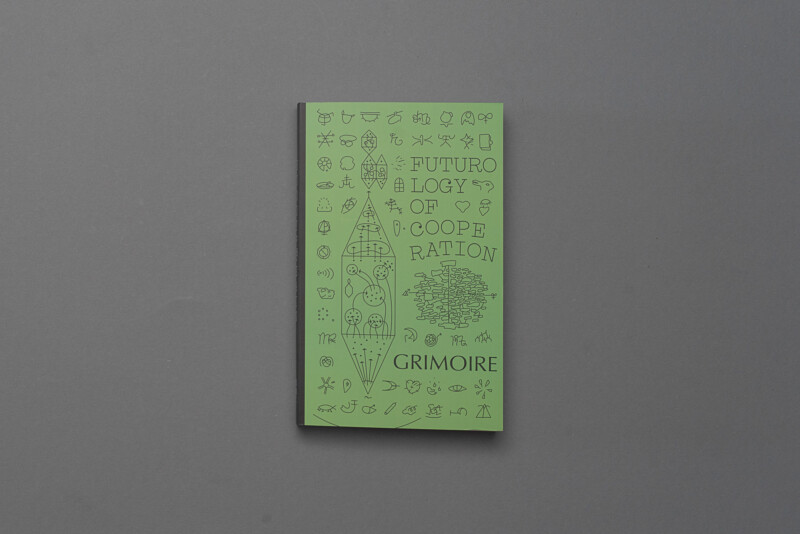 publicationLees, kijk, luisterresearchSusanne Kriemannresearcher Ashes and Broken Brick Work of a Logical Theory
publicationLees, kijk, luisterresearchSusanne Kriemannresearcher Ashes and Broken Brick Work of a Logical Theory publicationLees, kijk, luisterresearchHans Beckers Sonare Motus
publicationLees, kijk, luisterresearchHans Beckers Sonare Motus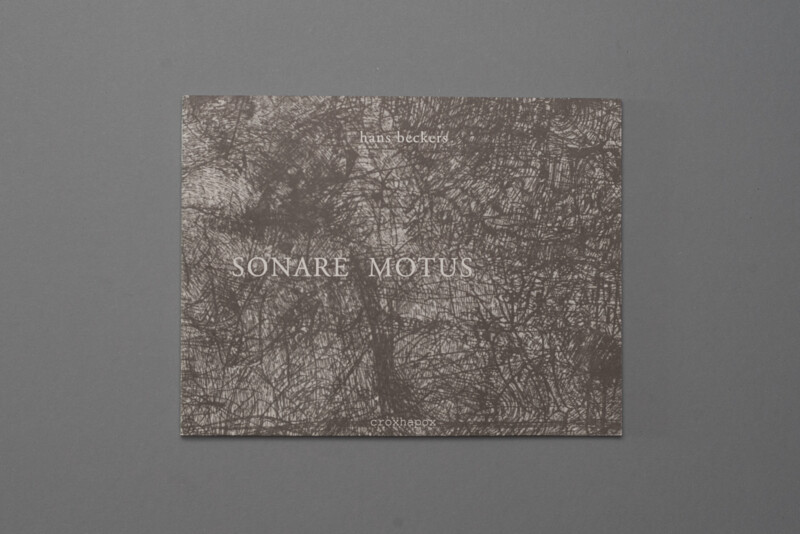 publicationLees, kijk, luisterresearchJan Kempenaersresearcher Spomenik
publicationLees, kijk, luisterresearchJan Kempenaersresearcher Spomenik publicationLees, kijk, luisterresearchMekhitar Garabedianresearcher Yavreeges Hokeet Seerem (My beloved / My little one, let me love your soul)
publicationLees, kijk, luisterresearchMekhitar Garabedianresearcher Yavreeges Hokeet Seerem (My beloved / My little one, let me love your soul)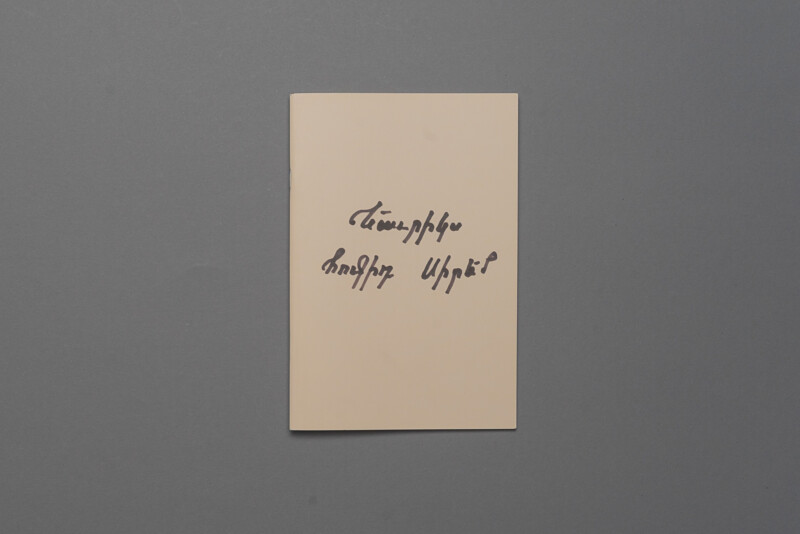 publicationLees, kijk, luisterresearchSteven Heyde, Sylvie Van Dammeresearcher The Future of Estate Landscapes in Europe
publicationLees, kijk, luisterresearchSteven Heyde, Sylvie Van Dammeresearcher The Future of Estate Landscapes in Europe publicationLees, kijk, luisterresearchDirk Van Goghresearcher Relational Design
publicationLees, kijk, luisterresearchDirk Van Goghresearcher Relational Design publicationLees, kijk, luisterresearchSofie Vandamme De mens ... Maat van alle dingen
publicationLees, kijk, luisterresearchSofie Vandamme De mens ... Maat van alle dingen publicationLees, kijk, luisterartistic activitiesJohan Grimonprezresearcher It’s a Poor Sort of Memory That Only Works Backwards
publicationLees, kijk, luisterartistic activitiesJohan Grimonprezresearcher It’s a Poor Sort of Memory That Only Works Backwards publicationLees, kijk, luisterresearchMekhitar Garabedianresearcher Something About Today
publicationLees, kijk, luisterresearchMekhitar Garabedianresearcher Something About Today publicationLees, kijk, luisterresearchHilde D’haeyereresearcher Dislexicon
publicationLees, kijk, luisterresearchHilde D’haeyereresearcher Dislexicon publicationLees, kijk, luisterresearchSofie Vandamme Geluk: Drang of Dwang
publicationLees, kijk, luisterresearchSofie Vandamme Geluk: Drang of Dwang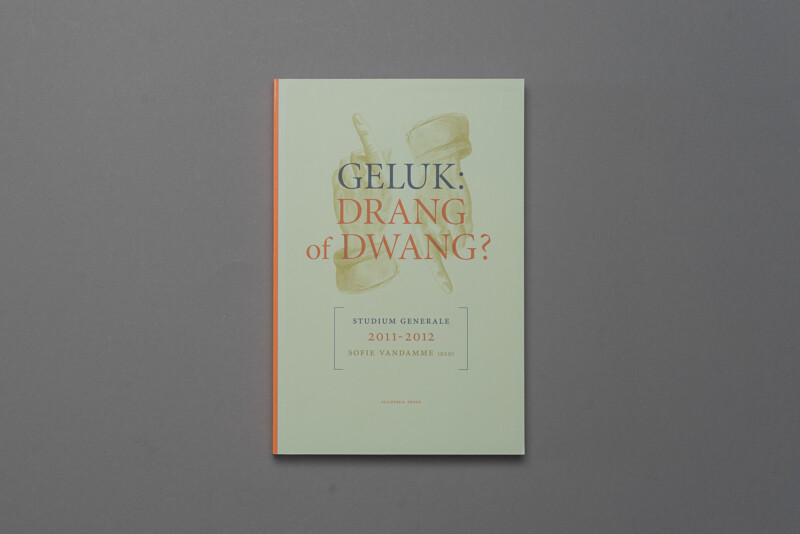 publicationLees, kijk, luisterartistic activitiesRiet Steel, Elly Van Eeghem, et al.researcher Reading Urban Cracks
publicationLees, kijk, luisterartistic activitiesRiet Steel, Elly Van Eeghem, et al.researcher Reading Urban Cracks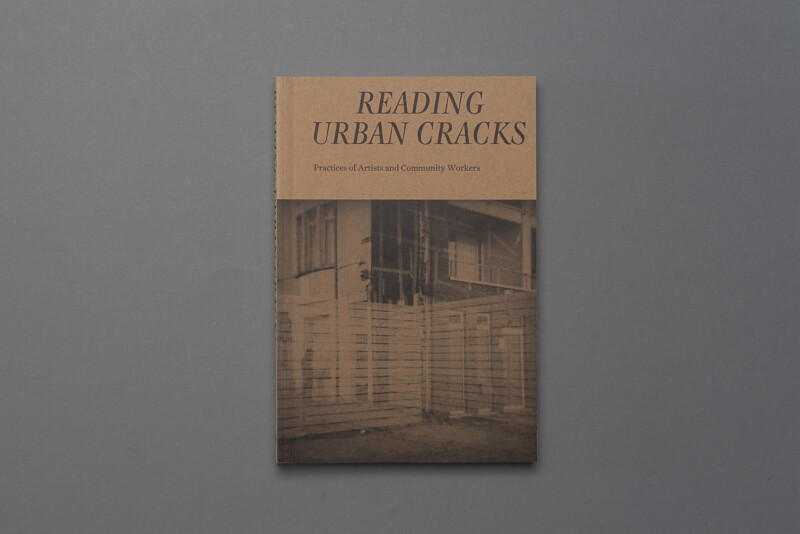 publicationLees, kijk, luisterresearchStefanie Kiwittresearcher Wondelgemse Meersen
publicationLees, kijk, luisterresearchStefanie Kiwittresearcher Wondelgemse Meersen publicationLees, kijk, luisterresearchJan Kempenaersresearcher Picturesque
publicationLees, kijk, luisterresearchJan Kempenaersresearcher Picturesque publicationLees, kijk, luisterresearchJan Kempenaersresearcher Dun Briste
publicationLees, kijk, luisterresearchJan Kempenaersresearcher Dun Briste publicationLees, kijk, luisterresearchJerry Galleresearcher Poëtische machine
publicationLees, kijk, luisterresearchJerry Galleresearcher Poëtische machine publicationLees, kijk, luisterresearch
publicationLees, kijk, luisterresearch